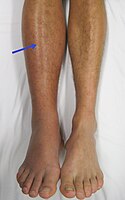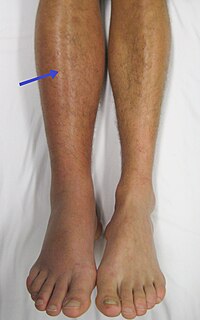
Relationship between type of unprovoked venous thromboembolism and cancer location: An individual patient data meta-analysis.
Sign Up to like & getrecommendations! Published in 2019 at "Thrombosis research"
DOI: 10.1016/j.thromres.2019.02.011
Abstract: BACKGROUND Unprovoked venous thromboembolism (VTE) may be the first manifestation of an underlying cancer. We aimed to assess the period prevalence of occult cancer detection stratified by VTE location (deep vein thrombosis [DVT], pulmonary embolism… read more here.
Keywords: location; analysis; venous thromboembolism; unprovoked venous ... See more keywords

Comparative risk of major bleeding with rivaroxaban and warfarin: Population‐based cohort study of unprovoked venous thromboembolism
Sign Up to like & getrecommendations! Published in 2019 at "European Journal of Haematology"
DOI: 10.1111/ejh.13185
Abstract: To assess the association between rivaroxaban and warfarin and major bleeding risk in unprovoked venous thromboembolism (VTE) patients. read more here.
Keywords: venous thromboembolism; rivaroxaban warfarin; major bleeding; unprovoked venous ... See more keywords

Screening for occult cancer after unprovoked venous thromboembolism: Assessing the current literature and future directions
Sign Up to like & getrecommendations! Published in 2022 at "European Journal of Haematology"
DOI: 10.1111/ejh.13874
Abstract: While significant evidence has established an increased rate of thrombosis in patients with cancer, the risk of occult malignancy in the setting of an unprovoked thrombosis is less clear. Despite continued interest in developing an… read more here.
Keywords: occult; unprovoked venous; malignancy; venous thromboembolism ... See more keywords

Risk scores for occult cancer in patients with unprovoked venous thromboembolism: Results from an individual patient data meta‐analysis
Sign Up to like & getrecommendations! Published in 2020 at "Journal of Thrombosis and Haemostasis"
DOI: 10.1111/jth.15001
Abstract: The Registro Informatizado de Pacientes con Enfermedad TromboEmbólica (RIETE) score and the Screening for Occult Malignancy in Patients with Idiopathic Venous Thromboembolism (SOME) risk scores aim to identify patients with acute unprovoked venous thromboembolism (VTE)… read more here.
Keywords: thromboembolism; venous thromboembolism; unprovoked venous; occult cancer ... See more keywords

Long-term risk of recurrence after discontinuing anticoagulants for a first unprovoked venous thromboembolism: protocol for a systematic review and meta-analysis
Sign Up to like & getrecommendations! Published in 2017 at "BMJ Open"
DOI: 10.1136/bmjopen-2017-016950
Abstract: Introduction For patients with a first unprovoked venous thromboembolism (VTE), the optimal duration of anticoagulation is a crucial clinical dilemma which has yet to be resolved. The decision to stop anticoagulant therapy (AT) after the… read more here.
Keywords: vte; risk; analysis; first unprovoked ... See more keywords

The prevalence and clinical manifestation of hereditary thrombophilia in Korean patients with unprovoked venous thromboembolisms
Sign Up to like & getrecommendations! Published in 2017 at "PLoS ONE"
DOI: 10.1371/journal.pone.0185785
Abstract: Background Hereditary thrombophilia (HT) is a genetic predisposition to thrombosis. Asian mutation spectrum of HT is different from Western ones. We investigated the incidence and clinical characteristics of HT in Korean patients with unprovoked venous… read more here.
Keywords: family history; hereditary thrombophilia; unprovoked vte; korean patients ... See more keywords